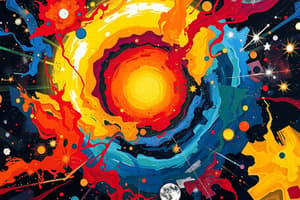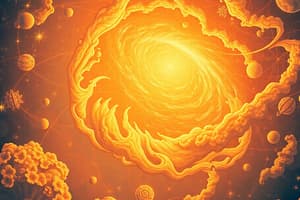Podcast
Questions and Answers
What is the best-supported theory of the origin and evolution of the universe?
What is the best-supported theory of the origin and evolution of the universe?
The Big Bang Theory
Who first suggested the Big Bang Theory?
Who first suggested the Big Bang Theory?
Georges Lemaitre
What are the four fundamental forces of the universe?
What are the four fundamental forces of the universe?
- Weak nuclear force (correct)
- Electromagnetism (correct)
- Gravity (correct)
- Strong nuclear force (correct)
In the first second after the Big Bang, matter formed into __________ and __________.
In the first second after the Big Bang, matter formed into __________ and __________.
The first stars began to form 180 million years after the Big Bang.
The first stars began to form 180 million years after the Big Bang.
What percentage of the universe is made up of dark energy?
What percentage of the universe is made up of dark energy?
What is the afterglow from the Recombination event called?
What is the afterglow from the Recombination event called?
Which elements were first assembled into nuclei after the Big Bang?
Which elements were first assembled into nuclei after the Big Bang?
The universe's expansion continues at a higher rate due to __________.
The universe's expansion continues at a higher rate due to __________.
Flashcards are hidden until you start studying
Study Notes
Origins of the Universe
- The Big Bang Theory proposes that the universe originated from a singular point, which was extremely compact and less than a billion billionth the size of an atom.
- This theory is supported by the observation that galaxies are receding from us at high speeds, a concept central to cosmology.
- Georges Lemaitre proposed the Big Bang Theory in the 1920s, later supported by Edwin Hubble's galaxy observations and the discovery of Cosmic Microwave Background Radiation (CMBR) by Arno Penzias and Robert Wilson.
Early Universe
- In the first 10^-43 seconds, all four fundamental forces (gravity, electromagnetism, strong nuclear force, weak nuclear force) were unified as a single force before rapidly separating.
- The expansion of the universe occurred through a process called Inflation, where matter and energy spread out violently.
- As the universe cooled, fundamental particles known as fermions and bosons emerged from a state known as Quark-Gluon Plasma.
Formation of Matter
- Photons collided intensely, creating pairs of matter and antimatter during the universe's hot early phase; however, most of these pairs annihilated each other.
- Surviving matter coalesced into protons and neutrons within the first second after the Big Bang, leading to the formation of the first atomic nuclei (75% hydrogen and 25% helium) within three minutes.
Recombination and Cosmic Background
- Recombination occurred around 380,000 years later, allowing electrons to form stable atoms, which permitted light (photons) to travel freely, resulting in the Cosmic Microwave Background Radiation that is detectable today.
Galactic Development
- The first stars ignited approximately 180 million years after the Big Bang, as gravity gathered hydrogen clouds, aided by dark matter.
- The event of Reionization marked a pivotal moment when the light from the first stars stripped electrons from neutral atoms, illuminating the universe.
Evolution of the Universe
- Within 400 million years, the first galaxies formed, leading to a billion years of reformed stars and galaxies creating heavier elements.
- The Milky Way structure formed several billion years after the Big Bang, eventually giving rise to our Solar System.
Composition of the Universe
- Dark Energy, which constitutes 68% of the universe, and Dark Matter, which comprises 27%, dominate the universe's total mass and energy.
- Observable matter (including stars, planets, and galaxies) accounts for less than 5% of the universe.
Solar System Formation
- The Solar System formed approximately 9 billion years after the Big Bang, comprising less than 10% of its total mass in planets, asteroids, and comets.
- Supernovas and asteroid impacts played a crucial role in the evolution from single-celled to multicellular lifeforms.
Cosmic Timeline Analogy
- If the universe's history were compressed into a year, CMBR would form in January, with each month representing 1.25 billion years, illustrating the vast timeline of cosmic events.
Studying That Suits You
Use AI to generate personalized quizzes and flashcards to suit your learning preferences.





